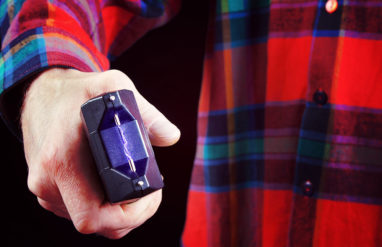When it comes to certain white women these days, it doesn’t matter what lovely moniker their parents may have given them. They’ve also been deigned with the name Karen, Becky, or Stacy.
Why? These common names are now shorthand for a certain kind of woman who either behaves badly or others like to complain about. As viral videos of Beckys blow up and the service industry cringes whenever a Karen asks to speak to the manager, these names have taken on a new meaning.
But are all three names now insults? What exactly do they mean when used this way? And are they interchangeable? When it comes to these names, it’s complicated.
If you’ve ever wondered which is worse—dealing with a Karen, Stacy, or Becky—go ahead and take a closer look.
What does Karen mean?
Karen is a generic name that’s common among middle-aged women. It was one of the top five most popular baby names for girls from 1957–1966, and peaked at #3 in 1965, according to Social Security data.
Karen is also the Danish form of Katherine, which is popularly associated with a Greek word for pure. However, the meaning of Karen has evolved over recent years. Record of the insult Karen appears as early as September 2016, and by 2020, Karen had gained a slang meaning that refers to a middle-aged white woman.
However, it doesn’t refer to just any middle-aged white woman. The popularization of Karen as an insult has been credited to Black Twitter in the 2010s, and it typically refers to a woman who fits the stereotype of an aggressive, racist, minivan-driving, white mom. Your typical Karen has a “speak to the manager” haircut that’s a variation of a blunt blonde bob. Karens are the types to complain to the manager about anything and everything, and have become the subject of memes as well as viral videos.
In 2020, Karens became further associated with bad behavior, as videos surfaced of women acting out over refusing to wear masks or social distance to protect against COVID-19 and also engaging in extremely racist behaviors. When these instances are captured on video, they tend to go viral, with the Karen in question being publicly shamed. For example, “Central Park Karen” was a white woman who called the police on a Black man birdwatching in the park. There was also a “Costco Karen” who was filmed throwing a tantrum over being asked to wear a face mask. And then there was “Zombie Karen” who ran into a glass door and licked it while screaming racist slurs after being refused entry to a bar.
In short, being called a Karen or told that you have a Karen haircut is not a compliment.
Learn more about what makes a Karen so recognizable here.
What does Becky mean?
Like Karen, Becky follows the trend of a first name being used to generalize a certain type of person. Again, we’re talking white women here. However, Beckys aren’t middle-aged, ignorant, and aggressive white moms. Instead they are typically younger white women who are unaware or take advantage of their privilege. Beckys are the new Valley Girls.
Becky is a pet form of the Biblical name Rebecca. However, the name became widely used as a slang insult in the late 2010s. Beyoncé helped solidify this in 2016 with her song “Sorry,” which references a Becky with the good hair whom many have interpreted to be a white woman.
In addition to referring to a woman unaware of her white privilege and acting racist, Becky is also used to mock basic young women who love their pumpkin spice, UGG boots, and social media photos. The key to this stereotype is that Beckys are basic: completely unoriginal and mainstream.
In addition to loving apple-picking in the fall and selfies, a Becky is stereotyped as a so-called basic bitch who is a privileged, sheltered, generic, and unlikeable white woman.
Read more about the history and usage of Becky as a slang term here.
What does Stacy mean?
Stacy is also a pejorative slang term for a woman. The origin of Stacy is obscure, and may come from Anastasia or Eustace. However, Stacy reached peak popularity in the United States in the 1970s–80s and can be spelled Stacey and Stacie. By 2011 it had taken on an entirely different connotation. Stacy now is used as a stereotype for an attractive woman who is vain, rude, and only interested in sex. Stacies are sexually active and looked down upon for it.
This version of Stacy originated from incel culture, which is an internet subculture of men who are celibate and blame women for their lack of sex lives. They use the term to describe typically white, blonde, women with porn-star bodies and a sensuality they hate because they can’t have them. Stacy is similar to the term whore: it’s dehumanizing, sexist, and scapegoats a woman who is deemed promiscuous by men.
WATCH: This Misogynistic Group Got Its Name From A Woman
Although her male counterpart, Chad, is viewed as a sexually active, successful male player, Stacy’s accomplishments in the bedroom are held against her.
Learn more about how the term Stacy has taken shape over time here.
How each name is used
Karen, Becky, and Stacy are similar in that they are all generic female names that have evolved over the years into slang terms that make fun of certain types of women. These names can be used in jest to call out real, problematic, and often racist behavior, and there’s no doubt that’s one effective way to point out and criticize the behavior in question.
One common misconception is that the terms are racist, but because the terms poke fun at the dominant group within a system of oppression (whites), they cannot by definition be described as racist.
However, the fact that there aren’t equivalent male terms for calling out the same behavior gives these terms a sexist dimension that must be acknowledged.
All that said, if you’re planning to use the terms or are trying to understand them, it’s important to note all three have negative connotations and call out white women but each refers to a slightly different stereotype.
Karen is typically used to describe someone who is almost always a middle-aged woman, and is racist, closed-minded and vocal about her often ignorant beliefs. She also may have a typical look: a short-haired blonde who wears mom jeans, runs a school carpool, and has an aggressive demeanor.
For example:
- Many of the other moms weren’t surprised when Karen got into a fight about vaccines in the middle of her son’s soccer game.
- After causing a scene because she was asked to wear a mask in the store, Karen demanded to speak to a manager.
As we’ve explained, Becky is similar in that she is also a closed-minded white female, but she’s typically a younger woman who is entitled and guided by her white privilege.
For example:
- Becky didn’t understand the controversy behind the college admissions scandal since her parents also made a large donation to her top choice when she applied to schools.
- While hanging out at the pool with her friends, Becky almost called the police on her Black neighbor because she says she didn’t recognize him.
Stacy is most similar to Becky but is used for more of a sexualized and sexist stereotype. It slams a sensual, attractive blonde due to her looks.
For example:
- Not only does Jack bully Steve, but he called one of my friends a Stacy because she doesn’t give him the time of day.
- These aren’t the only terms that seem to have no male equivalent. You can read about other words in English that only apply to women here.
- Regardless of gender, we all know a few people who insert and impose themselves in our lives. Would that make them “intrusive” or “obtrusive”?














